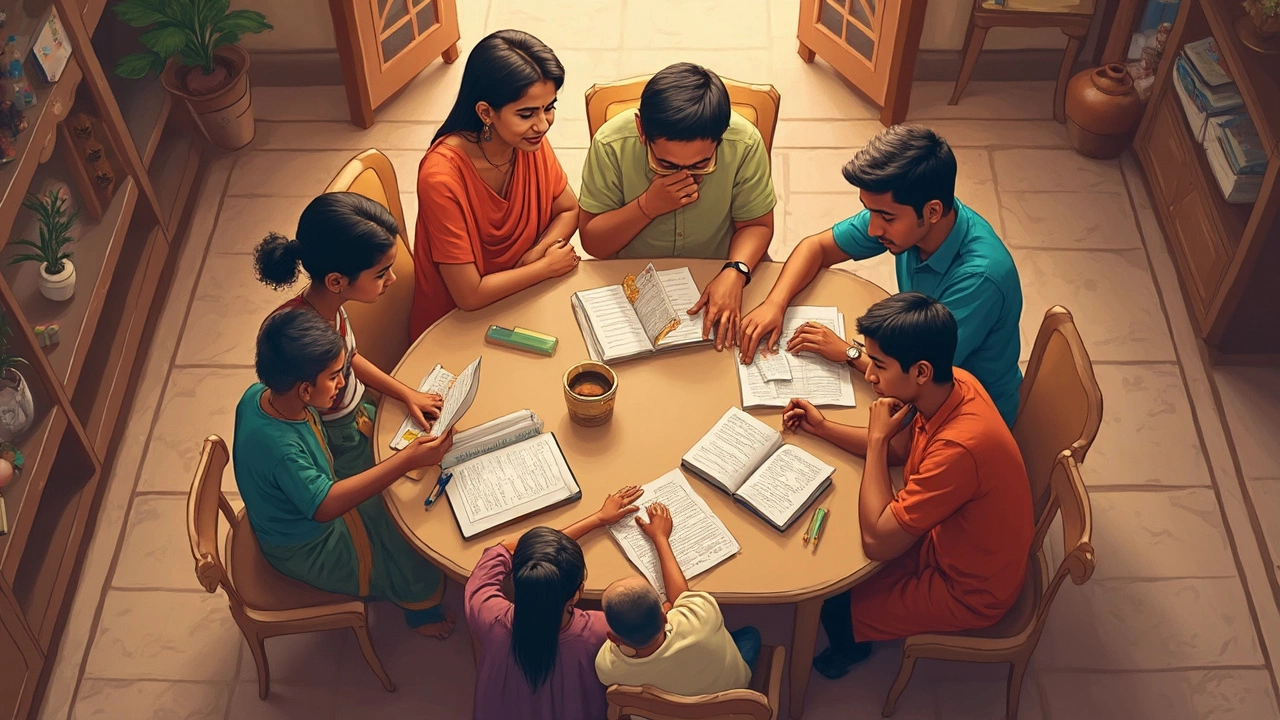Parents lose sleep wondering if they're picking the right school board for their kids. Some swear by CBSE, others push for ICSE, IB, or state boards. But with college competition so fierce and job markets always shifting, the question keeps coming up: does choosing CBSE actually put you ahead in the future?
Here's the thing—most students don't realize how much board choice can affect not just board exam marks, but the way they actually think and handle pressure outside the classroom. CBSE has a rep for being student-friendly, but does that translate into better chances at engineering, medicine, or even international careers?
Panic doesn't help, but solid info does. So let’s break down what makes the CBSE syllabus different, why it matters for big entrance tests, and whether it's truly the golden ticket everyone claims. This way, you can make a smart call without just following the crowd. Plus, look out for some lesser-known facts and tips along the way—you might just find the answer you didn’t expect.
- What Makes CBSE Stand Out?
- How Does CBSE Compare to Other Boards?
- CBSE and Competitive Exams: Is It the Edge?
- Future Opportunities After CBSE
- Tips to Choose the Right Board for Your Goals
What Makes CBSE Stand Out?
When people talk about school education in India, CBSE is usually the first name that pops up. Why? For starters, CBSE is run by the national government, so its syllabus stays the same across India—whether your school is in Mumbai, Guwahati, or a small town in Kerala. This standardization makes it a popular choice for families who move cities because of work.
One big reason students like the CBSE board is its straightforward, concept-based approach. The syllabus is focused on science and math, and keeps language pretty user-friendly. It's also famous for pushing students to understand basics, not just memorise. This comes in handy when you’re cracking competitive exams like JEE or NEET, since those tests follow the CBSE framework closely.
Check out these numbers to see how big CBSE really is in India:
| CBSE At a Glance (2024-25) | Data |
|---|---|
| No. of CBSE schools in India | ~27,000 |
| No. of CBSE schools overseas | 240+ |
| Total students (Grades 1-12) | over 24 million |
| Languages offered | 40+ |
Another underrated thing? The board lets students pick from lots of subjects, even skill-based and vocational courses, starting from Class 9. So if you hate pure academics and want to try things like Artificial Intelligence or Financial Literacy, it's all there.
One more tip—CBSE’s textbooks (the NCERT ones) go through regular updates so what you’re learning is current and in line with national goals. You also won’t find surprise twists on the exam paper. The pattern matches exactly what you practised all year, cutting down panic. If a kid’s eyeing national-level scholarships or Olympiads, most of those also follow CBSE content for questions.
- All-India recognition—good for parents and students who move cities.
- Simple language in textbooks, less rote learning.
- Heavy focus on science, maths, coding, and life skills.
- Helps prep for big exams—JEE, NEET, UPSC, etc.
- Regular teaching workshops so teachers are up to date with best practices.
The board isn’t perfect, but if you want a well-tuned, widely accepted syllabus that also helps build exam strategy as you go, CBSE makes a strong case for itself.
How Does CBSE Compare to Other Boards?
If you stack up CBSE next to boards like ICSE, State Boards, or IB, each one feels like it’s got its own flavor. Parents often get confused—so what’s really different?
The CBSE syllabus is famous for being straightforward and structured. It leans toward science and math, which makes it super useful if your kid is eyeing fields like engineering or medicine later. Plus, CBSE teaching focuses a lot on NCERT textbooks, which are actually the core of most competitive exams in India. That means less running around for extra study material.
Now, take ICSE. It has a rep for a much broader syllabus, with more focus on English and practical knowledge. ICSE is tougher in some ways because kids are expected to write detailed answers and read more books. Great if your child enjoys writing or wants options abroad, but sometimes all that detail can be overwhelming.
IB (International Baccalaureate), on the other hand, is super flexible and encourages critical thinking from the start. Projects, independent research, and open-ended questions are the norm. It’s even accepted worldwide for university admissions but often comes with higher fees and a more challenging learning curve.
State Boards vary a ton by state and can sometimes be more about rote learning and less about critical skills. Syllabi aren’t always updated as quickly as CBSE or ICSE, and the recognition isn’t always consistent if you move between states or plan to study outside India.
- CBSE: standard syllabus, strong for engineering/medicine, widely accepted across India
- ICSE: focus on English, detailed syllabus, good for creative fields or overseas studies
- IB: global acceptance, project-based learning, best for critical thinking
- State Boards: local language support, varying quality and recognition
Here’s a tip: If your family moves cities a lot, sticking with CBSE usually makes transfers less of a headache, since most schools across the country offer it. Plus, the assessment style is simpler, so kids can focus more on understanding concepts instead of memorizing long answers.
So, picking a board isn’t just about academic reputation—it’s about your child’s strengths, your goals as a parent, and sometimes even practical stuff like how often you might move cities. Trust your gut, but use the facts too.

CBSE and Competitive Exams: Is It the Edge?
If you’ve ever asked around about the CBSE syllabus, you’ve probably heard that it lines up pretty well with India’s big entrance exams—things like JEE Main, NEET, and even a bunch of government job tests. It’s not just talk. The truth is, major national-level exams use NCERT books (which the CBSE syllabus is built on) as their core material. So, if you’re studying from the same books as the exam creators, you just naturally get more familiar with the style and content of the questions that pop up in these tests.
When you break down past year papers of entrance exams, patterns jump out. CBSE students usually don’t have to scramble to adjust to question formats, because these are almost identical to what they’ve seen during their school years. That’s a stress-buster. Plus, since the CBSE syllabus is quite streamlined, students get more time for mock tests and coaching, rather than getting lost in extra topics or complicated projects often found in other boards.
But there’s more to it. Competitive exams focus a lot on concepts and problem-solving, not just memorizing. CBSE often trims weighty theory and keeps things simple and to the point. The result? More practice solving different types of problems, which is exactly what entrance tests demand.
If you’re aiming for exams like:
- JEE (Engineering)
- NEET (Medical)
- CUET (for Central Universities)
- UPSC Civil Services (at least for basics)
—CBSE gives you a head start. Tons of toppers come from CBSE schools, and it’s not luck. They’re used to the pace and practice style that these exams expect.
Quick tip: If cracking competitive exams is your top goal, make sure you know the NCERT textbooks inside and out. Even plenty of top coaching institutes highlight important NCERT chapters and suggest CBSE students have it easier when hunting for study shortcuts.
That said, don’t assume it’s a guarantee. Success still boils down to how hard you work and how consistent you stay, but choosing CBSE does take away one big extra hurdle—you’re working off the same playbook as the exam makers.
Future Opportunities After CBSE
What you maybe haven't heard: picking CBSE opens doors, not just for Indian colleges, but for a bunch of other options too. Because it follows a national curriculum tuned to competitive exams, CBSE students have advantages that literally shape their next steps. Want proof? About 80% of students cracking top exams like NEET and JEE are from CBSE schools, according to data from the National Testing Agency (NTA).
The CBSE curriculum builds a foundation that's perfect for Indian entrance exams. But that's not all. CBSE results are basically accepted by every major university across India—public and private alike. Even for some courses abroad, especially in the US and Canada, an authentic CBSE transcript sets you up smoothly. In fact, top overseas universities often recognize CBSE marks as equivalent to their own high school standards.
| Pathway | CBSE Advantages |
|---|---|
| Engineering/Medical (India) | Exam-focused syllabus, NTA-aligned preparation |
| Study Abroad | Accepted by major US/Canada/UK schools |
| Central Government Jobs | Central syllabus matches eligibility criteria |
| Indian Private Universities | Direct admission eligibility, no hassle with mark conversion |
Here's a practical tip: when aiming for competitive exams (like JEE, NEET, or CUET), going through the CBSE pattern means you’re already getting used to the exam language—saving tons of revision time. It's also smoother when shifting to schools in other cities or even abroad, since most international schools in India recognize the CBSE format.
To give you an inside view, listen to this advice from Dr. Raghavan Iyer, admissions advisor for a top Delhi college:
“We see CBSE students blending in fast at the university level, especially for science and technical streams, because their curriculum is more in sync with newer methods of testing and applied learning.”
Parents love asking, "Will my kid get a fair chance if we move states?" With CBSE, schools and government schemes (like scholarships) rarely need extra certification. No state board transfer headaches. Add to that, the flexibility: CBSE now lets students choose subjects that can match any interest, from media studies to advanced math.

Tips to Choose the Right Board for Your Goals
The choice of board isn’t just about textbooks or school uniforms. It’s about matching the learning style, future plans, and even stress levels of your child. Here’s what you need to think about before you pick the “right” board.
- CBSE shines if your main aim is cracking big entrance exams like JEE or NEET—because most of these tests stick closely to the CBSE syllabus. If you’re eyeing institutions in India, that’s a big plus.
- ICSE is tougher on English and has a bit heavier workload overall. Great for kids who may want to focus more on humanities or dream about going abroad. Its detailed syllabus is a good warmup for the IB later on, too.
- The IB (International Baccalaureate) is less about rote learning and more about understanding concepts deeply. If you’re planning a move abroad or aiming for global universities, this comes in handy. Just know that it’s a costlier option in most Indian cities.
- State boards are usually cheaper and can be more flexible. If you’re aiming for state-level government jobs or prefer learning in your regional language, this can be a strong pick. But the syllabus may not align with national entrance tests or international university requirements.
Confused about how these boards stack up on real outcomes? Take a look at this quick breakdown:
| Board | Main Focus | Best For | Exam Alignment |
|---|---|---|---|
| CBSE | Science, Math, National Curriculum | Engineering, Medical, Central Government Exams | High |
| ICSE | Languages, Literature, Broad Subjects | Humanities, Commerce, English Skills | Moderate |
| IB | Critical Thinking, Research | International Studies, Skill-Based Learning | Low for Indian Exams |
| State Boards | Regional Subjects, Local Curriculum | State-level Colleges & Jobs | Varies |
Few tips that actually work:
- Let your child’s learning style guide you. Kids who love activities and open-book assessment may gel better with IB, while those who need structure might do well in CBSE.
- Check where most alumni are going for higher studies—ask your school about last year’s results and college placements.
- If you plan to move between states in India, CBSE is usually safer. It’s accepted everywhere and avoids the “syllabus mismatch” headache.
- Consider the school’s teaching quality and extra-curriculars, not just the board. A mediocre ICSE school can hold back a bright student, while a great CBSE school can open lots of doors.
Don’t get caught up in what relatives or neighbors say—it’s your child who lives with this choice daily. Sit down and talk openly with them about what feels right, then go with the decision as a team.
